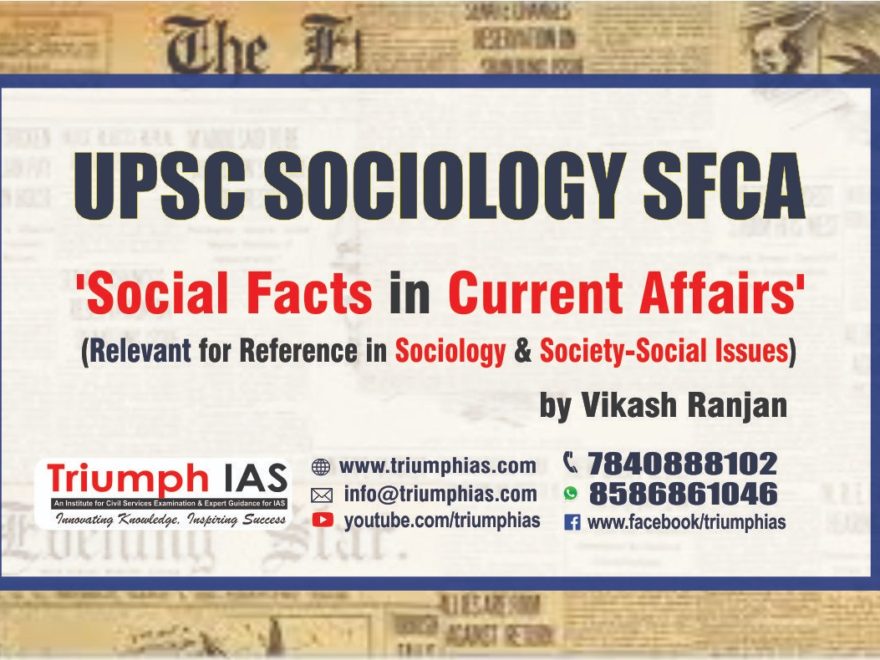TOWARDS SUCCESS OF SOCIO-POLITICAL REFORMS
- (Relevant for Sociology Syllabus: Paper 2 – Social Movements in Modern India)
- (Relevant for GS Syllabus: Paper1- Social empowerment)
India got its Independence nearly 75 years ago. The fight for Independence which lasted for 190 years was not only a political fight but it was more of a social struggle against untouchability, caste system, Sati system, child marriage, infanticide, female education and many more. Political independence was just one of the goal of our independence movement.
If we look closely at our history, we will observe that we were always very accommodative of the rulers irrespective of their origin. Since ancient times we have witnessed the waves of foreign rulers from Indo-greeks, Shaka-Parthians to Mughals and then English.
However, with the exception of Britishers, we seldom opposed any other ruler. In fact, we accommodated them and made them Indian. Many say that we are not a melting pot of cultures as is the USA, however, we are more of a barbecue which gives Indian colour to any culture which comes to our place with maintaining their own identity. This ensured their existence as well as ours and we remained happy and prosperous for a longer period of history.
However, Britishers from the very beginning they started as a trading company. They never wanted to be a part of India. They were profit-oriented business persons who got a chance to rule a country, and after the industrial revolution in Britain, they changed the whole scenario of the Indian subcontinent.
In order to increase their profits, they started large scale deindustrialisation of India, even cut down thumbs of thousands of weavers, promoted orthodoxy in the society by maintaining a distance with social reforms and in this way promoted social evils. They always maintained racial superiority with concepts like social Darwinism and white men burden theory. In this way, they never became part of India.
These social evils have somewhat political roots. So, political freedom was necessary to remove social evils. However, with a degraded social fabric, the political war of independence against mighty Britain was not possible. It was even witnessed in the great revolt of 1857.
So, at first, the leaders started to work for socio-religious emancipation of the country. In this regard, Raja Ram Mohan Roy, Ishwar Chandra Vidyasagar, Sahjanand Saraswati, Anni Baesent, Savitribai Phule etc all did remarkable work. In the later stages, it got merged with the demand for Independence and especially Gandhiji worked tremendously for socio-political emancipation of the country. Gandhiji even more emphasised on the removal of untouchability along with other social evils. For him, political freedom would mean nothing without social emancipation.
The remarkable aspect about socio-political movement at that time was that the leaders took step by step progression towards a greater goal rather than achieving it in a single strike. This also meant that they took from the government what they got, instead of taking it all at once. This also meant that their movement was sustained for over a period of time.
However, the present socio-political movements seem to have learnt no lesson from that history. Today our leaders have become non-negotiable with their demands and they also became impatient. And, as a result in the end they are getting nothing. It is always better to get 5 demands fulfilled out of 10 and then again protest for leftover demands after six months and get some more and repeat the process. The rigidity related demands is today visible in almost all movements from Anna’s Lokpal to farmers and traders movements, and with the state becoming too powerful if just takes it few weeks to break down such movements.
Along with this, today our leaders lack integrity. As a result, their social connect is also not as effective. Also, because of the lack of integrity, their dedication towards a cause is also not so strong. However, in past, we have witnessed leaders with impeccable integrity. We have seen that Raja Ram Mohan Roy’s own mother discarded him for his support against Sati system and he despite that continued his efforts against sati. Gandhiji himself cleaned his excreta because he preached dignity of labour. But today, it is normal for a socio-religious leader to preach abolition of caste while following all the caste rules.
In today’s globalised-material world, the material things and identity became so important that they are easily tradable with the integrity and values of a person. And as result, we can see a near-complete socio-religious reform movement in the present era. The process that our national leaders started which once sprinted like a rabbit is now even struggling to creep like a snail.
Today, we not only need a forward-looking modern ideology but above all we need ethical leaders with impeccable integrity, because success or failure of a movement not only depends upon its ideology or protestors above all, it depends upon its leaders.
DEVOLUTION OF POWERS AND FINANCES UP TO LOCAL LEVELS: ROLE OF WOMEN
- (Relevant for Sociology Syllabus: Paper 2 – Politics and Society )
- (Relevant for GS Syllabus: Paper1- Role of women and women‘s organization)
- It is said that the reservation of seats for women in the institution of local self-government has had a limited impact on the patriarchal character of the Indian political process.
- The 73rd and 74th constitutional amendments facilitated the large-scale participation of women in political institutions at the local and regional levels and required that no less than one-third of the total seats in local bodies should be reserved for women through Article 243D in every panchayat and 243T in every municipality. Because of this, India has the most women in elected positions roughly around 1.4 million.
ATTAINMENTS:
- Since female political representation is there, women come forward and report crimes.
- Greater investments in drinking water, priority public goods.
- Rural women are growing in confidence and experience while functioning as leaders of the local bodies.
- Mobilizing rural resources and encouraging SHGs for financial security.
- They have sensitized gender issues.
- They play critical role in identifying the “out of the school” children and to the success of ‘mid-day meal’ programme.
Patriarchy provides the sexual hierarchical ordering of society for political control says Zillah Eisenstein (1979).
It has several implications:
- Politics as field is considered inappropriate for women, reason for shortfall in mandatory quota.
- Male politicians believe that increase in number of women representatives would not ensure quality.
- Reports suggest that women elected are not allowed to move freely for security reasons.
- Most male counterparts think male members of their families make the decisions and doubt women capabilities to deliberate and take independent decisions.
- Men outnumbering women ignore their points of view.


